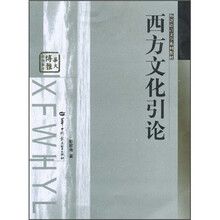外语语言文学系列教材·华大博雅高校教材:西方文化引论

目 录内容简介
Chapter One The Ancient Greeks
Ⅰ. History
1. The Minoans
2. The Mycenaeans
3. Classsical Greece
3. 1 The war with the Persians
3.2 Civil wars
3. 3 Cultural life
4. The Macedonians
4. 1 Alexander the Great
4. 2 The Hellenistic Age (336-31 BC)
Ⅱ. Religion
1. Religion in ancient Greece
2. Origin of Greek mythology
3. Gods as protectors
4. Worship
5. Features of Greek mythology
5.1 Polytheism
5.2 Personification
5.3 Metamorphoses
5.4 Omnipotence
5.5 Diversity of attributes
5.6 Different stories of a god
5.7 Characters with the same name
5.8 A history of its own
6. Mythology and superstition of Greeks
7. Hero worship
8. The preservation of Greek mythology
9. Greek mythology and various branches of learning
10. Position of Greek mythology in modern life
Ⅲ. Philosophy
1. Greece, a land of philosophers
2. Plato (430-347 BC)
3. Aristotle (384-322 BC)
Ⅳ. Literature
1. Greek poetry
1.1 Homer
The Iliad
The Odyssey
1.2 Hesiod
2. Greek drama
2.1 Aeschylus (525-456 BC)
2. 2 Sophocles (496-406 BC)
2. 3 Aristophanes (450-385 BC)
Chapter Two The Ancient Romans
Ⅰ. Origin Of Rome
Ⅱ. Roman Republic
1. The Founding of Roman Republic
2. Social structure
3. Political life of Roman Republic
4. Expansion of Rome
4. 1 Early expansion
4. 2 The Roman legion
4.3 The three Punic Wars (264-146 BC)
4. 4 The war with Macedon (214-146 BC)
4. 5 The conquest of Asia Minor
4. 6 Provincial government
5. Social problems of the Republic
5.1 The Social War (90-88 BC)
5. 2 The First Civil War (88-82 BC)
5.3 Slave uprising
5.4 The generals' abuse of power
5. 5 The Second Civil War (49-45 BC)
5.6 End of Caesar's dictatorship
5.7 The Second Triumvirate
Ⅲ. Literature during the Republic
1. Drama
1.1 Titus Maccius Plautus (250-184 BC)
1.2 Terence (190/180-159 BC)
2. Prose
2. 1 Gaius Julius Caesar (100-44 BC)
2. 2 Marcus Tullius Cicero (106-43 BC)
3. Poetry
Titus Lucretius Carus (99-55 BC)
Ⅳ. The Roman Empire
1. Augustus
2. Pax Romana
3. Engineering and architecture
Ⅴ. Roman Religion
1. Roman mythology
1.1 Origin
1.2 Worship
1.3 The identification with Greek gods
1.4 Deification
2. Divination
Ⅵ. Literature in the Roman Empire
1. Poetry
1.1 Virgil (70-19 BC)
1.2 Horace (65-8 BC)
1.3 Ovid (43 BC-18 AD)
2. Fiction
Apuleius (1247-1757 AD)
Chapter Three The Jews and Early Christianity
Ⅰ. A Brief History of the Jews
1. The Israelites
2. The Jews
3. The appearance of the Hebrew Bible
4. Synagogue
5. Hellenization of Jews
6. Roman conquest and Anti-Roman revolt
7. Judaist groups
Ⅱ. The Birth of Christianity
Ⅲ. Early Christian Worship
Ⅳ. The Spread of Christianity
1. Early missionaries
2. Persecution against Christians
3. Church organization
4. Emergence of Christianity as the religion of the Roman Empire
Ⅴ. Basic Ideas of the Christian Faith
Ⅵ. Christianity and Some Other Beliefs
Ⅶ. The Establishment of the Papacy
Ⅷ. Reasons for the Success of Christianity
Ⅸ. Major Christian Festivals
1. Christmas
2. Easter
Ⅹ. An Introduction to the Bible
1. The Old Testament
1.1 The books of law
1.2 The books of history
1.3 The books of poetry
……
Chapter Four The Medieval Period
Chapter five renaissance
Chapter six the enlightenment period
Chapter Seven the romantic period
Chapter eight realism and naturalism
Chapter nine modernism and the rise of popular culture
bibliography
Ⅰ. History
1. The Minoans
2. The Mycenaeans
3. Classsical Greece
3. 1 The war with the Persians
3.2 Civil wars
3. 3 Cultural life
4. The Macedonians
4. 1 Alexander the Great
4. 2 The Hellenistic Age (336-31 BC)
Ⅱ. Religion
1. Religion in ancient Greece
2. Origin of Greek mythology
3. Gods as protectors
4. Worship
5. Features of Greek mythology
5.1 Polytheism
5.2 Personification
5.3 Metamorphoses
5.4 Omnipotence
5.5 Diversity of attributes
5.6 Different stories of a god
5.7 Characters with the same name
5.8 A history of its own
6. Mythology and superstition of Greeks
7. Hero worship
8. The preservation of Greek mythology
9. Greek mythology and various branches of learning
10. Position of Greek mythology in modern life
Ⅲ. Philosophy
1. Greece, a land of philosophers
2. Plato (430-347 BC)
3. Aristotle (384-322 BC)
Ⅳ. Literature
1. Greek poetry
1.1 Homer
The Iliad
The Odyssey
1.2 Hesiod
2. Greek drama
2.1 Aeschylus (525-456 BC)
2. 2 Sophocles (496-406 BC)
2. 3 Aristophanes (450-385 BC)
Chapter Two The Ancient Romans
Ⅰ. Origin Of Rome
Ⅱ. Roman Republic
1. The Founding of Roman Republic
2. Social structure
3. Political life of Roman Republic
4. Expansion of Rome
4. 1 Early expansion
4. 2 The Roman legion
4.3 The three Punic Wars (264-146 BC)
4. 4 The war with Macedon (214-146 BC)
4. 5 The conquest of Asia Minor
4. 6 Provincial government
5. Social problems of the Republic
5.1 The Social War (90-88 BC)
5. 2 The First Civil War (88-82 BC)
5.3 Slave uprising
5.4 The generals' abuse of power
5. 5 The Second Civil War (49-45 BC)
5.6 End of Caesar's dictatorship
5.7 The Second Triumvirate
Ⅲ. Literature during the Republic
1. Drama
1.1 Titus Maccius Plautus (250-184 BC)
1.2 Terence (190/180-159 BC)
2. Prose
2. 1 Gaius Julius Caesar (100-44 BC)
2. 2 Marcus Tullius Cicero (106-43 BC)
3. Poetry
Titus Lucretius Carus (99-55 BC)
Ⅳ. The Roman Empire
1. Augustus
2. Pax Romana
3. Engineering and architecture
Ⅴ. Roman Religion
1. Roman mythology
1.1 Origin
1.2 Worship
1.3 The identification with Greek gods
1.4 Deification
2. Divination
Ⅵ. Literature in the Roman Empire
1. Poetry
1.1 Virgil (70-19 BC)
1.2 Horace (65-8 BC)
1.3 Ovid (43 BC-18 AD)
2. Fiction
Apuleius (1247-1757 AD)
Chapter Three The Jews and Early Christianity
Ⅰ. A Brief History of the Jews
1. The Israelites
2. The Jews
3. The appearance of the Hebrew Bible
4. Synagogue
5. Hellenization of Jews
6. Roman conquest and Anti-Roman revolt
7. Judaist groups
Ⅱ. The Birth of Christianity
Ⅲ. Early Christian Worship
Ⅳ. The Spread of Christianity
1. Early missionaries
2. Persecution against Christians
3. Church organization
4. Emergence of Christianity as the religion of the Roman Empire
Ⅴ. Basic Ideas of the Christian Faith
Ⅵ. Christianity and Some Other Beliefs
Ⅶ. The Establishment of the Papacy
Ⅷ. Reasons for the Success of Christianity
Ⅸ. Major Christian Festivals
1. Christmas
2. Easter
Ⅹ. An Introduction to the Bible
1. The Old Testament
1.1 The books of law
1.2 The books of history
1.3 The books of poetry
……
Chapter Four The Medieval Period
Chapter five renaissance
Chapter six the enlightenment period
Chapter Seven the romantic period
Chapter eight realism and naturalism
Chapter nine modernism and the rise of popular culture
bibliography
目 录内容简介
《外语语言文学系列教材·华大博雅高校教材:西方文化引论》的撰写初衷是为了了解甚至体验来自西方的精神文化生活。语言只是文化的载体,离开文化,语言不易掌握。对外语学习者如此,对教外语的老师来说,也需要提高西方文化修养。因为单纯的语言点讲解,不管你处理得多么精彩,如果缺乏人文知识的辅助,就不会引起学生的共鸣。解决以上问题的办法就是让学习者尽可能多地接触西方文化,可以将大学英语部分课时用于介绍西方历史、宗教、文学艺术等,在外语专业二年级下学期或三年级上学期增加西方文化课时。《外语语言文学系列教材·华大博雅高校教材:西方文化引论》是基于数年教学和研究的体会,其目的是服务广大外语学人。
比价列表
公众号、微信群
 缺书网
缺书网微信公众号
 扫码进群
扫码进群实时获取购书优惠






